As resident doctors returning to work after ugly strike face acute criticism, top medicos have this message for you: how about holding your politicians accountable for public healthcare?
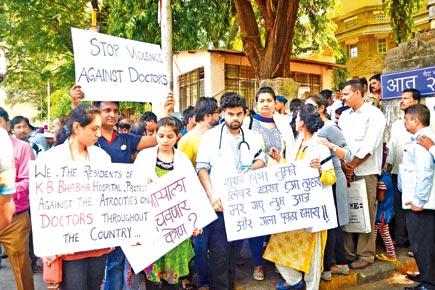
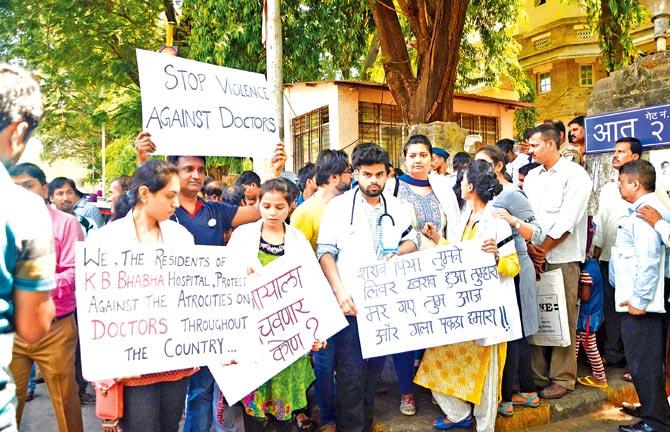
Resident doctors protest outside KEM hospital, Parel in Mumbai
In the 1980s, I was at Parel's KEM. These are wonderful places for us to work at and gain experience but the situation is extremely trying. Facilities are inadequate as are the number of beds. The doctor-patient ratio is also skewed. There are always people waiting and dissatisfied because they have been made to wait. Very often, the equipment is either not available, or, if available, it's malfunctioning. Nobody repairs these things. Diagnostic tools like X-ray machines and scans don't work.
ADVERTISEMENT
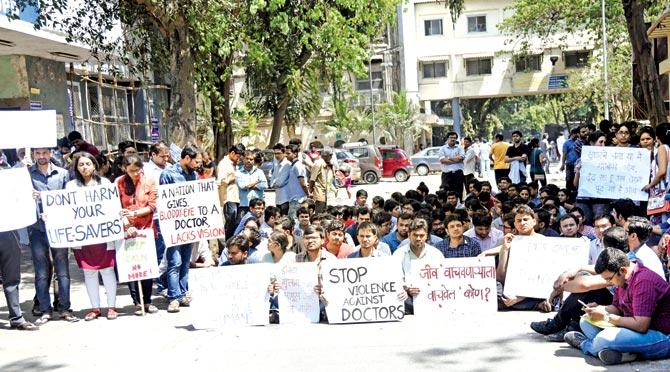
Some of the doctors across the city protesting violence against their colleagues by patients' relatives, returned to duty yesterday
The doctors are providing a service. While they might be using their skills to treat patients, they are dependant on the infrastructure, which the administration is responsible for. Why are patients getting agitated and beating up doctors? Because there's either a delay in getting treatment or somebody didn't get admitted to the ICU. But you can't drag a patient out of a bed if there's none available (for a new entrant).
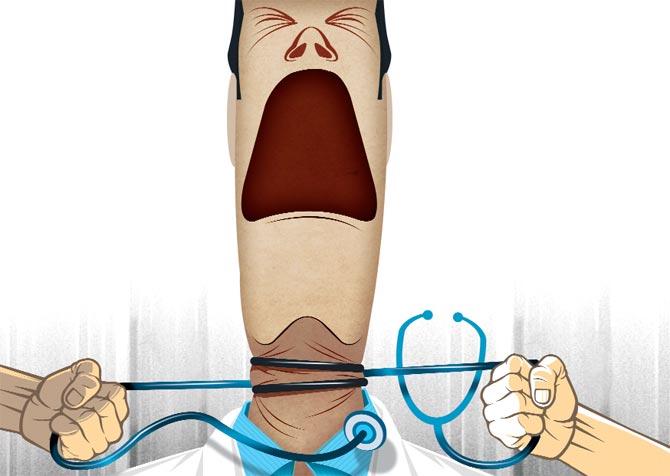
Illustration/Ravi Jadhav
My take is that facilities have to be provided by the administration. I think the doctor-patient ratio has become worse. There were stray incidents of attacks on doctors back then, but now it's worrisome. Resident doctors are the backbone of our healthcare, especially government hospitals. If the public treats them badly, I don't think they can function.
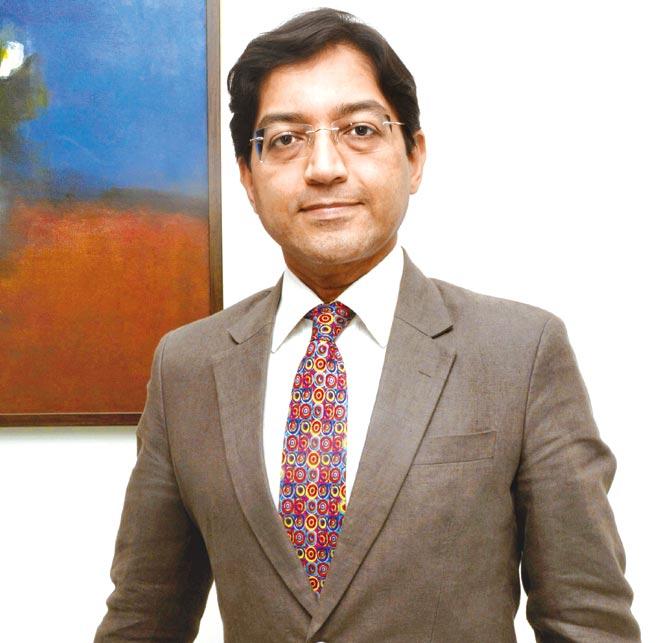
Dr Arun Mullaji, Joint Repair Surgeon, Breach Candy Hospital and Hinduja Surgical
The High Court judge, with all due respect, has told doctors to resign. I would like to see an HC judge give a verdict on a gangster surrounded by the gangsters' colleagues, 30-40 of them in an open room with no cop, telling him that you are going to die.
Also, there should be someone to communicate with the patients, someone who could spend time with them explaining the treatment and announcing the death. We need a counselor or medical social workers. Soft skills are not taught [to medical experts] which is a huge lacunae in our education system.
As told to Gitanjali Chandrasekharan
I can recall disturbing incidents as a junior doctor at a civil hospital in Lucknow and Ganga Ram Hospital in Delhi, when I feared I was going to be beaten by angry relatives. It shakes your confidence for a few days. It's the solid support of seniors and the mere presence of consultants somewhere in the hospital that allows you to regain your self-esteem.
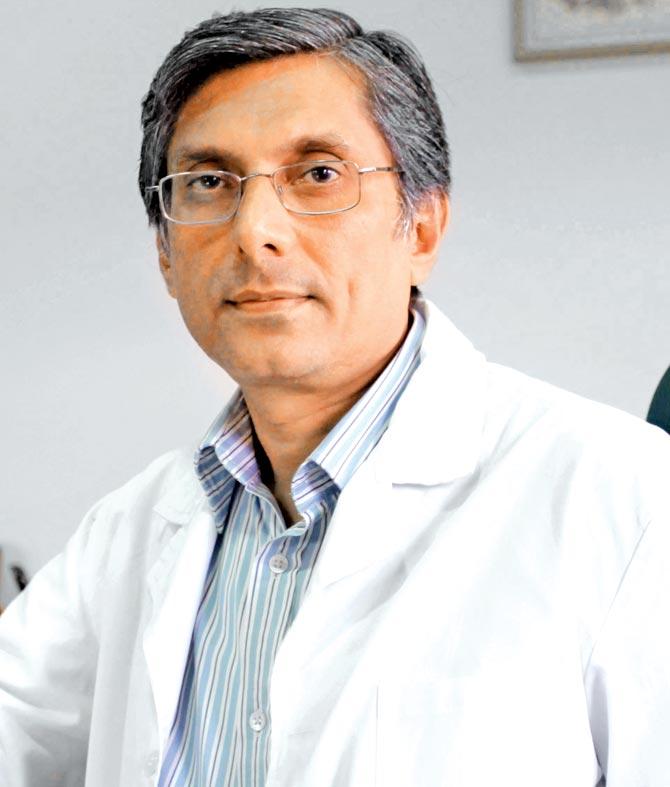
Dr Rajiv Sarin, director, Advanced Centre for Treatment, Research and Education in Cancer, Tata Memorial Centre
Doctors on strike is a perfect dilemma for me personally, and perhaps a Hobson's choice for the agitating junior doctors. In principle, doctors being indispensable to society, should never strike work, but if they ask me what else can they do to prevent being beaten and intimidated, while discharging their duties, I don't have an answer.
The junior doctors, in so many ways, compensate for the rising shortage of staff, beds or equipment against the backdrop of increasing patients and their expectations. And, when something goes wrong or is perceived to have gone wrong because of negligence, they get thrashed. That's just cruel.
For the junior doctors, it is a Hobson's choice because they either continue to strike or end it on the promise of authorities ensuring their safety. Often, negotiated promises for ending the agitation are seldom fulfilled in letter and in spirit. Doctors are acutely aware and pained by the knowledge that when they strike, their patients suffer.
So, they have to experiment with ingenious ways to get the public on their side. I liked that the AIIMS doctors wore helmets in support of their agitating colleagues elsewhere. May be all doctors can participate in such symbolic protest on a particular day of every month, and place prominent notices inside hospitals to highlight safety issues.
I say, save the doctor to save yourself when you need him.
As told to Jane Borges
While violence is rampant in various aspects of life, the attack on doctors must also be placed in the context of the passive privatization of the public healthcare system. For 60 years, we have placed healthcare as a commodity to be sold and bought. The private hospital's loyalty is to shareholders, not the patient. On the other hand, the patient is a consumer. Patients also feel short changed when they have to head to public hospitals for healthcare. So, the moment they enter a government hospital and are faced with apathy, they feel that the system has failed them.
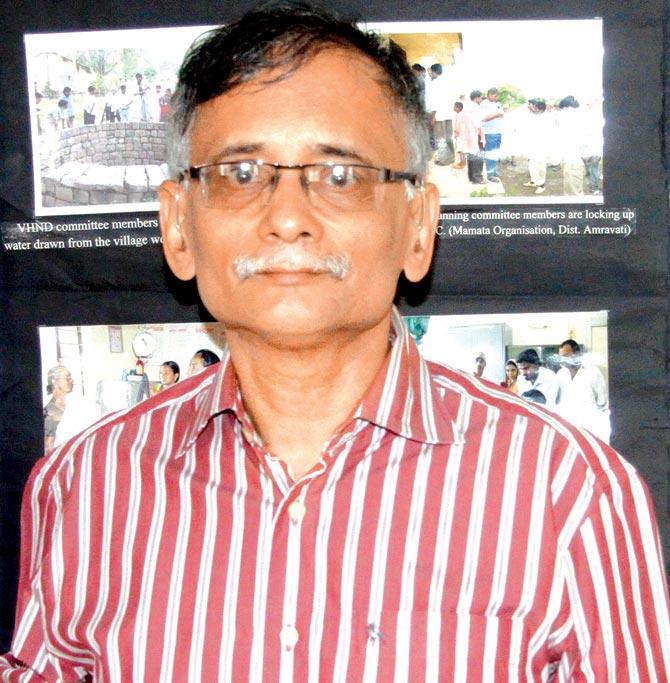
Dr Arun Gadre, Member of the Alliance of Doctors for Ethical Healthcare
Take the case of Sassoon Hospital in Pune. Set up in the British era, despite the expansion of the city, it remains the only public hospital of its kind. There should have been 10 Sasoons in Pune by now.
Teachers have also degenerated. Why wasn't a senior doctor around when the resident doctor was attacked? They get paid huge salaries, but where are they? A senior doctor must be present when a death is announced to relatives.
This year, the Maharashtra government cut its health budget by 4.4 per cent. Instead of raising it, they cut it. That's because politicians are not interested in public healthcare.
When I was in MARD, I was opposed to strikes. Doctors themselves don't want to strike, but the government pays you no heed unless there's a nuisance value.
As told to Gitanjali Chandrasekharan
A strike is never the answer to any problem, but you have to understand the plight of in-training doctors. They work long and odd hours in pathetic conditions with paltry wages that don't reflect their commitment, years of education or talent.
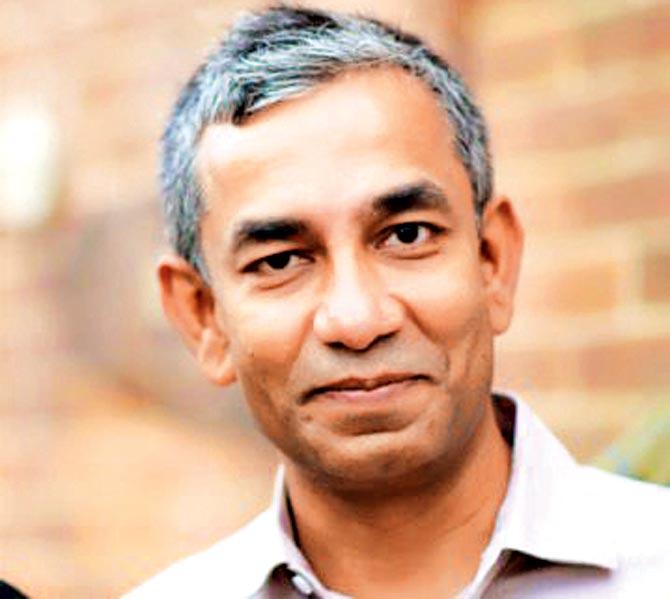
Dr Kamal Mahawar, Consultant General and Bariatric Surgeon, Sunderland Royal Hospital, UK, and author of The Ethical Doctor
Our public care facilities are languishing through decades of under-investment, inefficient management, and a complete lack of accountability. Unsurprisingly, patients only go there when they cannot afford to go anywhere else. How can effective healthcare ever be delivered in such an environment of trust deficit, when patients know that the system cannot be accountable? Under these circumstances, when things go wrong, patients and relatives cannot be confident that the best possible treatment was given. This results in them taking the law into their hands.
As an ordinary doctor, you shouldn't have to deal with a patient attacking you. This is not what we are trained for. We are not police or security personnel. Doctors are right in seeking protection from irate patients and relatives (and sometimes criminals who join them).
Public hospitals in India need to become much more accountable than they currently are. There should be opportunity for patients to confidently voice their grievances with the system. Patients should also be able to report instances of serious failings directly to the regulator (Medical Council of India), who should then investigate lapses and take appropriate corrective action. Management and even politicians should be held accountable if the funding and staff is inadequate, if doctors are made to work long hours without enough rest, and if facilities are not available to provide modern healthcare. Until we learn to examine the system in totality, questions like 'is the protest justified' seem somewhat immature.
As told to Jane Borges
1,100
No. of guards to be deployed across hospitals in 15 days as assured by CM
 Subscribe today by clicking the link and stay updated with the latest news!" Click here!
Subscribe today by clicking the link and stay updated with the latest news!" Click here!







